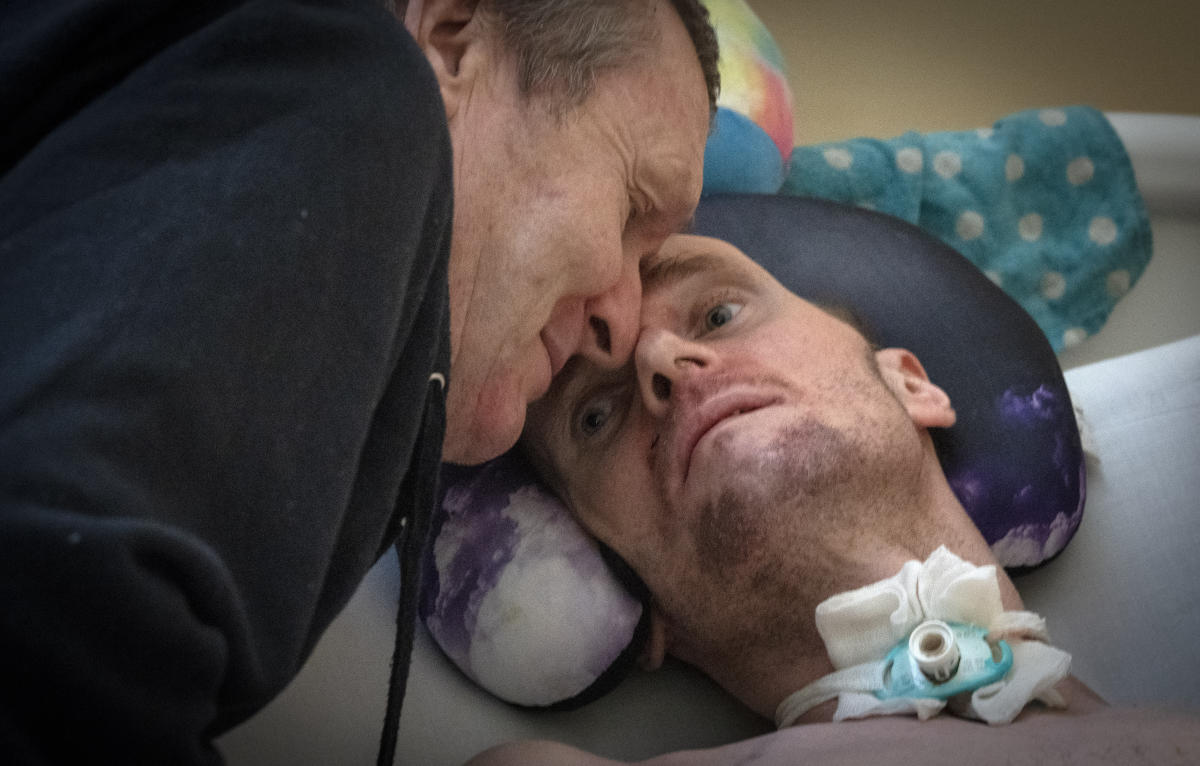CHERNIHIV, Ukraine (AP) — In a Ukrainian hospital ward for wounded soldiers, where daylight barely penetrates, a father talks for hours with his wounded son. Serhii Shumei, 64, never berated Vitalii for choosing to go to war. Even now, despite the damage to his son’s brain from an exploding artillery shell, Serhii feels pride, not pity.
“I have been with him constantly for the past five months, next to him, next to him, next to him,” says Serhii, himself a retired former soldier. “I’m not going anywhere. … except a cigarette.”
Vitalii, a 34-year-old commander of long-range anti-aircraft missiles, was wounded in the Donbas region of eastern Ukraine, which has become synonymous with horrific casualties in the ongoing fighting for both Ukraine and Russia. Exactly how deadly is unknown – because neither side says. From the stream of wounded soldiers coming from the front lines to hospitals like the one where Vitalii is located, it is clear that the costs are high.
Both sides have deployed troops and resources to capture or defend Donbas strongholds, during months of arduous, attrac- tive fighting to what has largely become a bloody stalemate. After setbacks elsewhere in Ukraine due to President Vladimir Putin’s nearly 11-month-long invasion, Russia is looking for some sort of local success in the Donbas, even if that just means taking control of one or two cities that lie in ruins. Ukraine wants to make Russia’s advance as costly as possible.
The Donbas cities of Bakhmut and Soledar have turned into hellscapes as a result. Ukrainian President Volodymyr Zelensky described them as “entirely destroyed”, littered with corpses and craters, and with “almost no life left”.
“This is what madness looks like,” says Zelenskyy.
Vitalii was wounded on 25 August on another part of the Donbas frontline, in Advivka, about 70 kilometers (45 mi) south of Bakhmut. The shell that hit his dugout set off other explosives. The blast tore a crater in Vitalii’s skull that is as deep and wide as half a melon. His brain injury was so severe that doctors doubted he would show signs of consciousness again.
Now Vitalii sometimes seems aware of his surroundings. He blinks. He can swallow. But he is largely immobile.
Serhii refuses to give him up.
“We are seeing some progress, we are getting back on our feet. This is my opinion,” he says.
He spends hours at Vitalii’s bedside, sharing news from the battlefields, reciting from books and reading messages of support.
They are sent by grateful Ukrainians urging Vitalii to “Hold on to life! We really need you!” and say “You are strong! You can do it!”
Serhii says tears are rolling down Vitalii’s cheeks as he reads them to him. Other signs of improvement appeared in late December, when Vitalii started wiggling his toes, Serhii says. Vitalii also begins to frown, which Serhii interprets as his son being interested in what he is reading to him.
And recently, says Serhii, another breakthrough: audible responses from Vitalii.
“I started asking him ‘Do you know who I am?’ And he replied ‘daddy’.
Another frequent visitor to Vitalii is Iryna Timofeyeva, a volunteer whose brainchild was to collect letters of support.
“The love of the family, the attention of other people, very often helps the patient’s positive dynamic,” she says. “It is very important for the injured person that he is not alone. This is how he understands that he has to fight.”
Vitalii is alone in his ward for the time being, after other patients have been transferred elsewhere for rehabilitation. But the beds around him are unlikely to remain empty for long given the intensity of the fighting in the Donbas. Vitalii Hospital in Chernihiv, north of Ukraine’s capital Kiev, is one of several hospitals where soldiers receive long-term follow-up care after their wounds stabilize closer to the fronts.
Serhii feels that caring for his son is his contribution to the war effort.
‘I’ll help him get back on his feet. This is my dream,” he says.
Leaning to his son’s ear, he asks, “Ukraine will win, we will win, right?”
The answer is silence.
___
Efrem Lukatsky in Chernihiv and John Leicester in Paris contributed to this report.
___
Follow AP’s coverage of the war at https://apnews.com/hub/russia-ukraine

